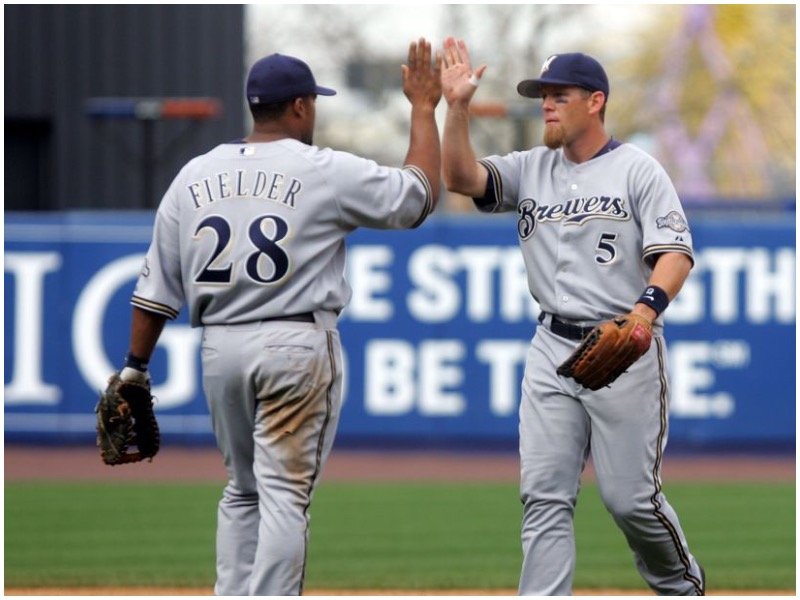The Milwaukee Brewers will honor two of the franchise’s best left-handed hitters and the two longest-tenured general managers in team history with a special pregame ceremony at Miller Park before tonight’s game against the Nationals.
Former first baseman Prince Fielder and ex-GMs Doug Melvin and the late Harry Dalton – represented by his wife, Patricia Dalton – will have plaques commemorating their careers permanently installed on the Brewers Wall of Honor along the north side of the stadium. Former outfielder Geoff Jenkins, who was elected as the 20th member of the Brewers Walk of Fame, will see his home plate-shaped granite plaque added to the exterior concourse around Miller Park just east of the Hot Corner entrance.
Induction into the Brewers Walk of Fame is distinctive, and deserved, recognition. But I also wanted to offer my own ode of appreciation for Jenkins, who was my favorite player growing up.
Jenkins, former outfielder, middle-of-the-lineup stalwart and distinctive three-true-outcomes player – in his case, strikeout, ground into double play or solo home run in a blowout loss – was one of the few bright spots on some really forgettable Milwaukee teams. Jenkins was fairly productive, actively involved in the community and unfailingly positive despite the club’s struggles; as a kid with few compelling options at the time for favorite Brewer, I loved cheering for him.
A first-round draft pick by the Brewers in 1995 (ninth overall), Jenkins becomes the 20th member of the Walk of Fame. He spent 10 of his 11 Major League seasons with the Brewers, batting .277 with 212 home runs and 704 RBI in 1,234 games. The lefty hitter with the high leg kick finished his career ranked among the franchise leaders in homers (second), slugging percentage (.496, second), RBI (fourth), hits (1221, fifth) and runs (661, fifth).
In 2000 Jenkins was the Brewers' team MVP, in 2003 he was an All-Star and in 2004 he became the eighth player in baseball history to strike out six times in a single game. In 2005, he switched from left field to right field to accommodate Carlos Lee; in 2006, he was benched for Corey Hart.
After the 2007 season, the Brewers declined his $9 million option, making him a free agent. The next year, when Jenkins returned to Miller Park midseason with the Phillies, he got a tribute video and an extended standing ovation from the crowd, which included me. And later that year, when the Brewers made the playoffs for the first time in a quarter-century, Jenkins won the 2008 World Series with Philadelphia.
Members of the Walk of Fame are elected by Wisconsin media members and Brewers executives. The ballot comprises those who wore a Brewers or Milwaukee Braves uniform as a coach, manager or player for at least three seasons and have been retired for at least three seasons. Jenkins, the team said, received 27 of 37 votes (73 percent), exceeding the required threshold of 65 percent.
Since Jenkins retired as a member of the Brewers in 2010, he’s returned several times for team and charity events. One time, he laughed, agreed and took a shot with me at Jo-Cat's when I made my dumb Jenkins three-true-outcomes joke. Already enshrined on the Wall of Honor, the Walk of Fame is another great tribute to a very good Brewer.
Fielder, the seventh overall selection by Milwaukee in 2002, spent seven of his 12 Major League years with the Brewers (2005-11), a power-hitting first baseman and one of the faces of their 2008 and 2011 playoff seasons. The three-time All-Star was the youngest ever to reach 50 career homers (23 years, 139 days) and is the only player in franchise history to produce five consecutive 30-plus homer seasons.
Fielder is the club’s all-time leader in on-base percentage (.390) and OPS (.929) and ranks among the top 10 in slugging percentage (.540, second), home runs (230, third), walks (566, third), RBI (656, seventh), runs (571, ninth) and batting average (.282, 10th). He only missed one game over his final three seasons in Milwaukee, and also was a beloved Brewer. The Walk of Fame ballot includes only those players that have been retired for a minimum of three seasons, though, so Fielder is not yet eligible.
Dalton was the club’s general manager for 14 seasons from 1978 to 1991, the longest tenure by a GM in franchise history. In 1980, Dalton acquired Hall of Famer Rollie Fingers, catcher Ted Simmons and pitcher Pete Vuckovich in a blockbuster trade with St. Louis. The Brewers reached the postseason in 1981 and 1982, including a World Series appearance in ’82, after going 95-67 during the regular season. Dalton was honored as Major League Executive of the Year by Sporting News that year. He passed away in 2005.
Melvin became the club’s eighth general manager in September 2002. Over his 13-year tenure, Melvin’s teams amassed 1,024 regular-season wins and two playoff berths, including a 2011 National League Central Division championship. He was named Major League Executive of the Year that season by Baseball America after the team won a franchise-record 96 games on the way to its first division title since 1982.
In 2008, Melvin helped bring the franchise its first postseason berth in 26 years as Milwaukee finished 90-72 to win the National League Wild Card. Melvin’s midseason acquisition of CC Sabathia from Cleveland was key to the 2008 postseason run, one of the most significant and memorable moves in team history.
According to the Brewers, the Wall of Honor commemorates players, managers, executives and broadcasters that meet a set criteria based on service to the organization. The Brewers and Braves Walls of Honor are permanent displays outside of Miller Park on the north side of the stadium adjacent to the Hot Corner entrance. Honorees on each wall have a plaque with their photo and a synopsis of their career.
The Brewers and Milwaukee Braves Historical Association also elected former pitcher Bob Buhl to the Braves Wall of Honor.
Buhl becomes the 17th member of the Milwaukee Braves Wall of Honor. He went 109-72 with a 3.27 ERA and five saves in 282 games (220 starts) over parts of 10 seasons with the Braves from 1953-62. The right-hander won a career-best 18 games in back-to-back seasons (1956-57) and led the National League in winning percentage (18-7, .720) during the Braves’ championship season in 1957. An All-Star in 1960, Buhl passed away in 2001.
Born in Milwaukee but a product of Shorewood High School (go ‘Hounds!) and Northwestern University (go ‘Cats!), Jimmy never knew the schoolboy bliss of cheering for a winning football, basketball or baseball team. So he ditched being a fan in order to cover sports professionally - occasionally objectively, always passionately. He's lived in Chicago, New York and Dallas, but now resides again in his beloved Brew City and is an ardent attacker of the notorious Milwaukee Inferiority Complex.
After interning at print publications like Birds and Blooms (official motto: "America's #1 backyard birding and gardening magazine!"), Sports Illustrated (unofficial motto: "Subscribe and save up to 90% off the cover price!") and The Dallas Morning News (a newspaper!), Jimmy worked for web outlets like CBSSports.com, where he was a Packers beat reporter, and FOX Sports Wisconsin, where he managed digital content. He's a proponent and frequent user of em dashes, parenthetical asides, descriptive appositives and, really, anything that makes his sentences longer and more needlessly complex.
Jimmy appreciates references to late '90s Brewers and Bucks players and is the curator of the unofficial John Jaha Hall of Fame. He also enjoys running, biking and soccer, but isn't too annoying about them. He writes about sports - both mainstream and unconventional - and non-sports, including history, music, food, art and even golf (just kidding!), and welcomes reader suggestions for off-the-beaten-path story ideas.







